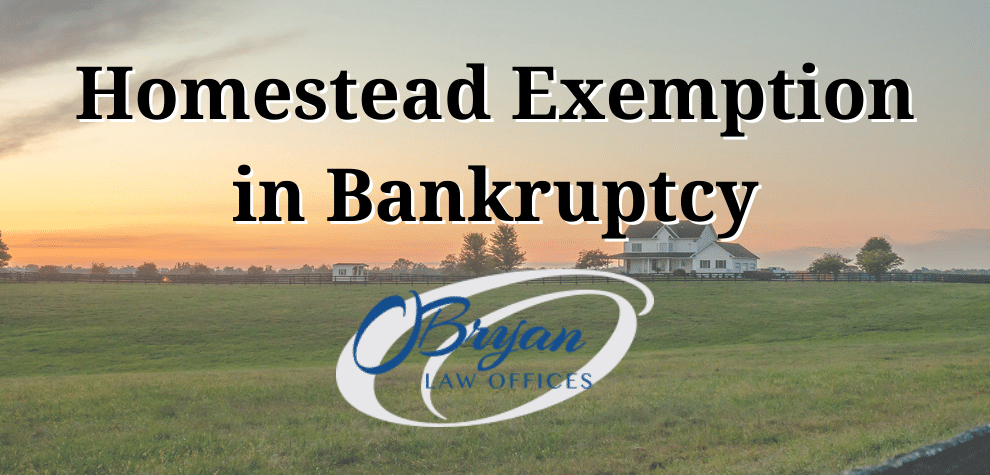For many, filing for Chapter 7 bankruptcy is a necessary step to take in order to get back on their feet. In Kentucky, many people use a homestead exemption in bankruptcy as a way to get a fresh start financially. These exemptions allow individuals with enough essential property to recover from their debts and achieve that new beginning they have been striving for.
At O’Bryan Law Offices, we help our clients who struggle financially achieve the fresh start they need. Chapter 7 bankruptcy allows many people to sell portions of their properties to pay their debts. With a property or homestead exemption in bankruptcy, this allows you to protect certain properties from liquidation. If you face financial uncertainty and want to hear your options, contact O’Bryan Law Offices today. Call our Louisville office at 502-339-0222 to schedule a free consultation with a Kentucky bankruptcy attorney today.
Are There Any Personal Exemptions Of Property in a Bankruptcy Claim?
Most states have very different bankruptcy laws and exemptions, including Kentucky. Luckily, Kentucky is one of the 20 states that allows its filers to choose between federal and state exemptions. This is actually beneficial for residents of Kentucky, as federal exemptions in bankruptcy tend to be more generous than state exemptions. Thus, most filers opt for federal exemptions.
But, what exactly is a Kentucky homestead exemption in bankruptcy? We cover this and much more in the following sections. We include an overview of federal exemptions for Kentucky filers, as well as the exemption amounts. Those who are married and jointly filing simply double the amount that we state below.
How Does a Bankruptcy Exemption Work?
Basically, bankruptcy exemptions allow you to protect those assets which are important to you, like cars, tools for work, clothes, and even retirement accounts. Exempt assets are safe from the trustee, in that, they can no longer sell it to pay off your creditors. In fact, many exemptions target specific assets up to a specific dollar amount. Sometimes, those exemptions even cover the entire value. Below, we outline how Chapter 7 and Chapter 13 exemptions work in bankruptcy.
Chapter 7 Bankruptcy Exemptions
This process is “liquidation,” which involves your bankruptcy trustee selling off your nonexempt property to pay your debts. However, exemptions help to protect your assets during a Chapter 7 bankruptcy filing. These exemptions disallow the trustee from selling certain assets.
Chapter 13 Bankruptcy Exemptions
Chapter 13, on the other hand, allows you to keep your property in order to reorganize your debts. However, keep in mind that how much you pay to your creditors depends on how much property you exempt. Basically, exemptions help keep your plan payments lower by reducing what you must pay to your creditors.
What is a Homestead Exemption in Bankruptcy?
The homestead exemption in bankruptcy serves to protect the equity of your home that serves as your primary residence. Equity is the value of that property, minus the balance of mortgages and other liens. In Chapter 7, the equity you are allowed to protect with an exemption helps determine whether or not you keep your home. In Chapter 13, you do not lose your home. However, you must pay creditors an amount which is equal to the value of the property you did not protect with an exemption, or your disposable income. It must be whichever is more.
How Do Bankruptcy Exemptions Protect My Homestead Property?
You have equity if your home is monetarily worth more than the balance of the mortgages and liens on it. This equity is actually an asset to you in Chapter 7. Your trustee might be able to sell your house, then use the equity to pay off your debts. However, homestead exemptions allow you to exempt certain monetary amounts of your equity, thus protecting it from the trustee.
Federal law allows you to exclude real property, like your home, co-op, or burial plot up to $25,150. However, it is required that you live in this property, otherwise the exemption amount is reduced by half. Unused homestead exemption portions, up to $12,575, can be applied to other properties. Basically, you keep your home if its equity is less than the allowable exemption amount. As we stated previously, the exemption amount doubles if you are married.
What States Have Homestead Exemptions?
Aside from New Jersey and Pennsylvania, all states have some form of homestead exemption in bankruptcy. The exemption amounts range from a maximum of $5,000 to an unlimited exemption amount. Kentucky’s homestead exemption limit is $5,000, but they do allow residents to go by federal standards. This increases their limit to $25,150. Some other states actually require their residents to use their state’s exemption limits, but not Kentucky.
How Do I Apply for a Homestead Exemption?
The best way to find out how to qualify for homestead exemption in bankruptcy is to speak with your bankruptcy attorney. We will handle all the legal heavy lifting, research, and paperwork necessary to get the help you need. Requirements differ from state to state, so checking with your local or county tax assessor’s office is essential. Some states require an application, while others do not. Keep in mind that your assessor will not require a payment or fee to fill out the application. Avoid any sites that ask for this payment.
Contact O’Bryan Law Offices Today for All Your Bankruptcy Needs
If you’re considering filing for bankruptcy, but want to save your home, there are options for your situation. Whether you’re considering Chapter 7 or Chapter 13 Bankruptcy, O’Bryan Law Offices can help you pay off or rearrange your debt in a way that works for you. With as much experience as we have, you can rest assured that a qualified Kentucky bankruptcy lawyer will be assigned to your case. To schedule a free consultation with a professional, please call our Louisville office at 502-339-0222 today.







